-
ARTÍCULO ORIGINAL29/07/2024
Contribution of informal caregivers to self-care in individuals with heart failure
Revista Brasileira de Enfermagem. 2024;77(3):e20230492
Resumen
ARTÍCULO ORIGINALContribution of informal caregivers to self-care in individuals with heart failure
Revista Brasileira de Enfermagem. 2024;77(3):e20230492
DOI 10.1590/0034-7167-2023-0492
Visualizações0Ver maisABSTRACT
Objectives:
to evaluate the contribution of informal caregivers to the self-care of individuals with heart failure.
Methods:
a cross-sectional study was conducted with 87 caregivers from March to October 2022 in the city of João Pessoa/PB. The caregivers’ contribution was assessed using the Caregiver Contribution to Self-Care of Heart Failure Index instrument. Scores ≥ 70 points indicate adequate contribution. Data were analyzed using descriptive statistics and Spearman’s correlation.
Results:
the sample consisted of 81.6% female caregivers. Median scores obtained for the self-care contribution scales were: 63.3 for maintenance; 55.5 for management; and 66.6 for confidence. Caregivers never or rarely recommended monitoring body weight, regular physical exercise, extra use of diuretics, and fluid restriction.
Conclusions:
informal caregivers showed inadequate contribution in the areas of maintenance, management, and confidence in self-care of individuals with heart failure.
-
ARTÍCULO ORIGINAL29/07/2024
Mental health of parents of children and adolescents who require special health care
Revista Brasileira de Enfermagem. 2024;77(3):e20230457
Resumen
ARTÍCULO ORIGINALMental health of parents of children and adolescents who require special health care
Revista Brasileira de Enfermagem. 2024;77(3):e20230457
DOI 10.1590/0034-7167-2023-0457
Visualizações0Ver maisABSTRACT
Objective:
To identify the manifestations presented by parents of children and adolescents who require special health attention that can impact their mental health.
Methods:
exploratory, qualitative research, based on the concept of vulnerability, with data collection carried out through interviews with 18 parents of children and adolescents with special health care needs, hospitalized in the pediatric ward of a hospital in Paraná, between May/2017 and May/ 2018. Data analyzed by inductive thematic analysis.
Results:
parents experienced situations of vulnerability when providing care at home, with repercussions on their mental health, expressed by manifestations of lack of protection, anxiety and depression.
Final considerations:
It is important that health professionals seek to expand actions to promote care and reduce situations that generate threats, insecurities, concerns and damage to the health of parents, which can impact and further weaken care for children and adolescents who need attention especially health.
-
29/07/2024
Reflections on theoretical framework use in nursing research
Revista Brasileira de Enfermagem. 2024;77(3):e20230486
Resumen
Reflections on theoretical framework use in nursing research
Revista Brasileira de Enfermagem. 2024;77(3):e20230486
DOI 10.1590/0034-7167-2024-0486
Visualizações0Ver maisABSTRACT
Objectives:
to reflect on theoretical framework use in nursing research.
Methods:
a theoretical-reflexive study, based on concepts and constructs pertinent to using nursing theories and other sciences, considering issues of epistemology or philosophy of science.
Results:
we presented what it is and why to do nursing research and what a theoretical framework is and why to use it, in addition to some considerations regarding theoretical framework use in nursing research, essential for constructing disciplinary knowledge, which enables the materialization of researchers’ work and the presentation of propositions resulting from investigations in and for nursing as a discipline and science.
Final Considerations:
based on a reflection based on epistemological conceptions, it is possible to affirm that a theoretical framework is the core of researchers’ thinking, delimiting a problem to be investigated and, based on it, outlining methodological strategies to be followed, supporting nursing action and thinking as discipline and science.

-
ARTÍCULO DE REVISIÓN29/07/2024
Nursing diagnoses for people hospitalized with heart failure: an integrative review
Revista Brasileira de Enfermagem. 2024;77(3):e20230471
Resumen
ARTÍCULO DE REVISIÓNNursing diagnoses for people hospitalized with heart failure: an integrative review
Revista Brasileira de Enfermagem. 2024;77(3):e20230471
DOI 10.1590/0034-7167-2023-0471
Visualizações0Ver maisABSTRACT
Objectives:
to identify in the literature the main nursing diagnoses according to the NANDA-I diagnostic classification for people hospitalized with heart failure.
Methods:
an integrative literature review, carried out in February 2019 and updated in July 2023, in the MEDLINE via PubMed, LILACS, SciELO and CINAHL databases. Given the use of acronym PEO, studies without a time cut in Portuguese, English and Spanish were included. Descriptive analysis was carried out to present the identified information.
Results:
analysis of 27 articles identified 24 nursing diagnoses, with emphasis on Decreased Cardiac Output, Excessive Fluid Volume, Decreased Activity Tolerance and Fatigue.
Final Considerations:
evidence can contribute to better diagnostic decisions centered on people with heart failure in search of more assertive health results and have the potential to support future studies on a possible syndromic pattern in this population.

-
ARTÍCULO ORIGINAL29/07/2024
Disrupted mother-fetus dyad risk in high-risk pregnancies: a Middle-Range Theory
Revista Brasileira de Enfermagem. 2024;77(3):e20230464
Resumen
ARTÍCULO ORIGINALDisrupted mother-fetus dyad risk in high-risk pregnancies: a Middle-Range Theory
Revista Brasileira de Enfermagem. 2024;77(3):e20230464
DOI 10.1590/0034-7167-2023-0464
Visualizações0Ver maisABSTRACT
Objectives:
to develop and evaluate a Middle-Range Theory for the nursing diagnosis “Disrupted Mother-Fetus Dyad Risk” in high-risk pregnancies.
Methods:
this methodological study was conducted in two stages: theory development and evaluation. Dorothea Orem’s General Nursing Model was used as the theoretical-conceptual foundation. Evaluation was conducted using the Delphi method with seven judges, and consensus was achieved when the Content Validity Index of the evaluated items was ≥ 0.80.
Results:
the theory identified 20 elements of the nursing diagnosis “Disrupted Mother-Fetus Dyad Risk” (10 risk factors, 4 at-risk populations, and 6 associated conditions), 14 propositions, and 1 pictogram. After two rounds of evaluation, the theory was considered consistent, with consensus reached for all items, each achieving a Content Validity Index ≥ 0.80.
Conclusions:
the Middle-Range Theory included biopsychosocial factors explaining the nursing phenomenon “Disrupted Mother-Fetus Dyad Risk,” which aids in nurses’ diagnostic reasoning.
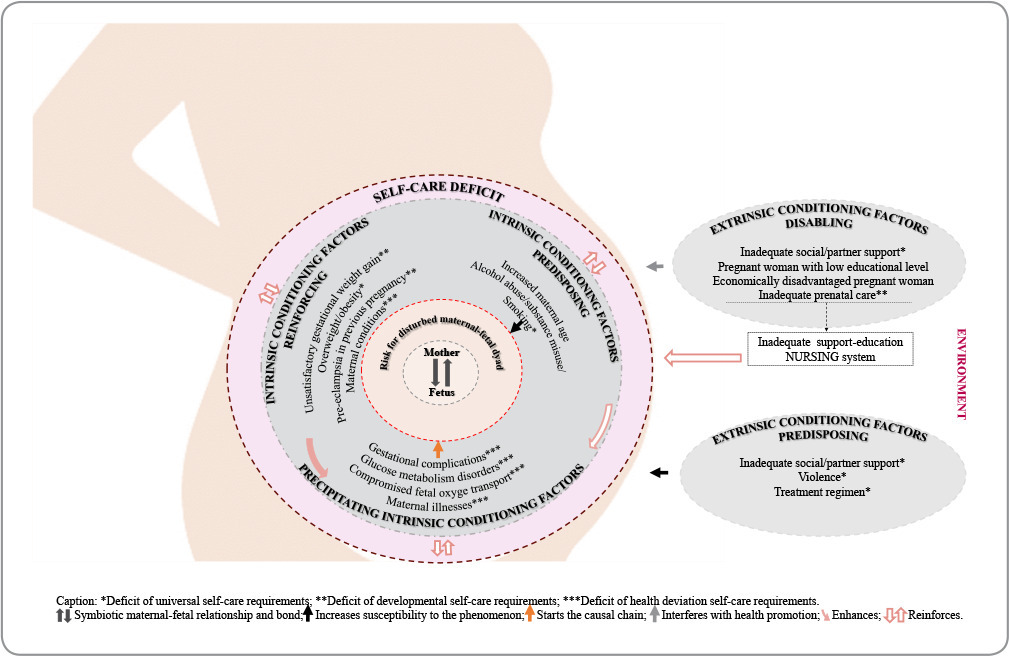
-
ARTÍCULO ORIGINAL29/07/2024
Family refusal of skin donation for transplantation: trends and associated factors
Revista Brasileira de Enfermagem. 2024;77(3):e20230209
Resumen
ARTÍCULO ORIGINALFamily refusal of skin donation for transplantation: trends and associated factors
Revista Brasileira de Enfermagem. 2024;77(3):e20230209
DOI 10.1590/0034-7167-2023-0209
Visualizações0Ver maisABSTRACT
Objectives:
to analyze the trends and factors associated with family refusal of skin donation for transplantation.
Methods:
this cross-sectional study was conducted in the State of São Paulo, with family authorization terms collected from 2001 to 2020. The variables analyzed included year, age, gender, cause of death, and type of institution. Data were analyzed using linear and multiple logistic regression, with the Odds Ratio estimated at p<0.05 for statistical significance.
Results:
1,355 individuals refused skin donation. The trend of refusals decreased between 2001 and 2009 in the age groups of 0-11 years and 12-19 years, but increased in the group aged ≥60 years. This trend continued to decrease in the 0-11 years group from 2010 to 2020, and increased in the 20-40 years group. Males and the age groups of 20-40 years, 41-59 years, and ≥60 years exhibited 27%, 34%, 47%, and 53% lower chances of refusal, respectively.
Conclusions:
there is an urgent need for measures to mitigate the high number of refusals associated with skin donation.
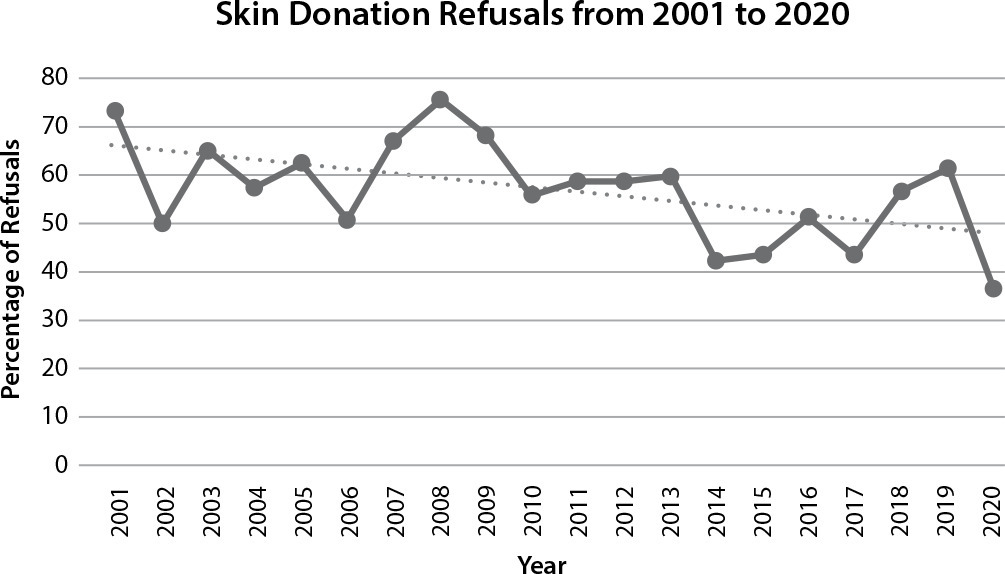
-
ARTÍCULO ORIGINAL29/07/2024
Primary Health Care in transitional care of people with stroke
Revista Brasileira de Enfermagem. 2024;77(3):e20230468
Resumen
ARTÍCULO ORIGINALPrimary Health Care in transitional care of people with stroke
Revista Brasileira de Enfermagem. 2024;77(3):e20230468
DOI 10.1590/0034-7167-2024-0468
Visualizações0Ver maisABSTRACT
Objectives:
to understand the role of Primary Health Care teams in caring for people with stroke after hospital discharge.
Methods:
single case study, with integrated units of analysis, with a qualitative approach. Data triangulation occurred through interviews with professionals and family caregivers involved in transition of care, in addition to direct observations in rounds and document analysis. For the analyses, the analytical strategies of theoretical propositions and construction of explanations were used, with the help of ATLAS.ti®.
Results:
the importance of counter-referral, the role of community health workers and the multidisciplinary team, health promotion, secondary prevention, home visits as a visceral attribute and nurses as care managers are evident.
Final Considerations:
the high demand on teams and the Social Determinants of Health interfere with adequate continuity of care. Transitional care programs that enable continuity of care are recommended.
-
ARTÍCULO ORIGINAL29/07/2024
Completeness of variables in Hospital-Based Cancer Registries for prostatic malignant neoplasm
Revista Brasileira de Enfermagem. 2024;77(3):e20230467
Resumen
ARTÍCULO ORIGINALCompleteness of variables in Hospital-Based Cancer Registries for prostatic malignant neoplasm
Revista Brasileira de Enfermagem. 2024;77(3):e20230467
DOI 10.1590/0034-7167-2023-0467
Visualizações0Ver maisABSTRACT
Objectives:
to analyze the completeness of variables from Hospital-Based Cancer Registries of cases of prostate neoplasm in the Oncology Care Network of a Brazilian state between 2000 and 2020.
Methods:
an ecological time series study, based on secondary data on prostate cancer Hospital-Based Cancer Registries prostate. Data incompleteness was classified as excellent (<5%), good (between 5%-10%), fair (10%-20%), poor (20%-50%) and very poor (>50%), according to the percentage of lack of information.
Results:
there were 13,519 cases of prostate cancer in the Hospital-Based Cancer Registries analyzed. The variables “family history of cancer” (p<0.001), “alcoholism” (p<0.001), “smoking” (p<0.001), “TNM staging” (p<0.001) had a decreasing trend, while “clinical start of treatment” (p<0.001), “origin” (p=0.008) and “occupation” (p<0.001) indicated an increasing trend.
Conclusions:
most Hospital-Based Cancer Registries variables showed excellent completeness, but important variables had high percentages of incompleteness, such as TNM and clinical staging, in addition to alcoholism and smoking.
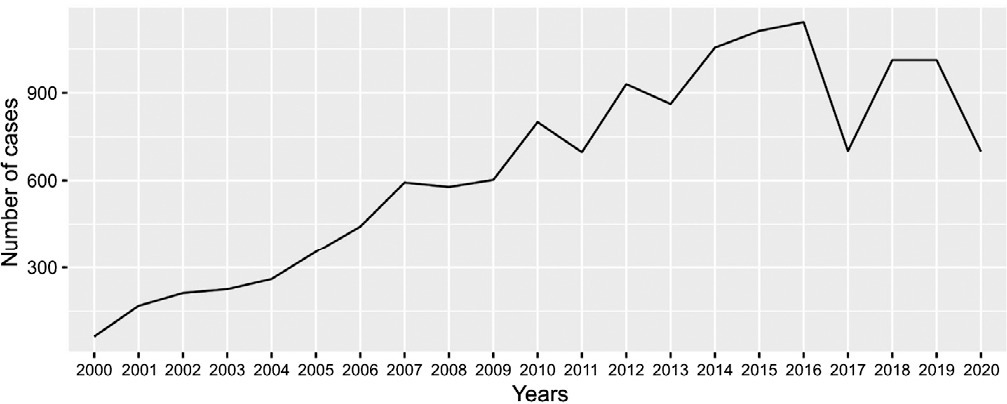
-
ARTÍCULO DE REVISIÓN30/03/2020
Internet influence on the biopsychosocial health of adolescents: an integratitive review
Revista Brasileira de Enfermagem. 2020;73(2):e20180766
Resumen
ARTÍCULO DE REVISIÓNInternet influence on the biopsychosocial health of adolescents: an integratitive review
Revista Brasileira de Enfermagem. 2020;73(2):e20180766
DOI 10.1590/0034-7167-2018-0766
Visualizações0Ver maisABSTRACT
Objectives:
To identify scientific evidence on the influence of internet use on adolescents’ biopsychosocial health.
Methods:
Integrative review, with database search, using the descriptors “internet”, “adolescent health” and “adolescent behavior”. After applying the inclusion and exclusion criteria, 16 articles were selected.
Results:
Knowledge convergence produced for three main themes was demonstrated: “Internet exposure time and possible damages to adolescent health”; “Internet, adolescent and cyberbullying”; and “Internet as a source of information for adolescent health”.
Final considerations:
The network involves an intricate network of interactions, providing varied behaviors and attitudes that reflect on adolescent health. Therefore, it is important to articulate nursing actions with the school community and the family, in order to carry out health education.
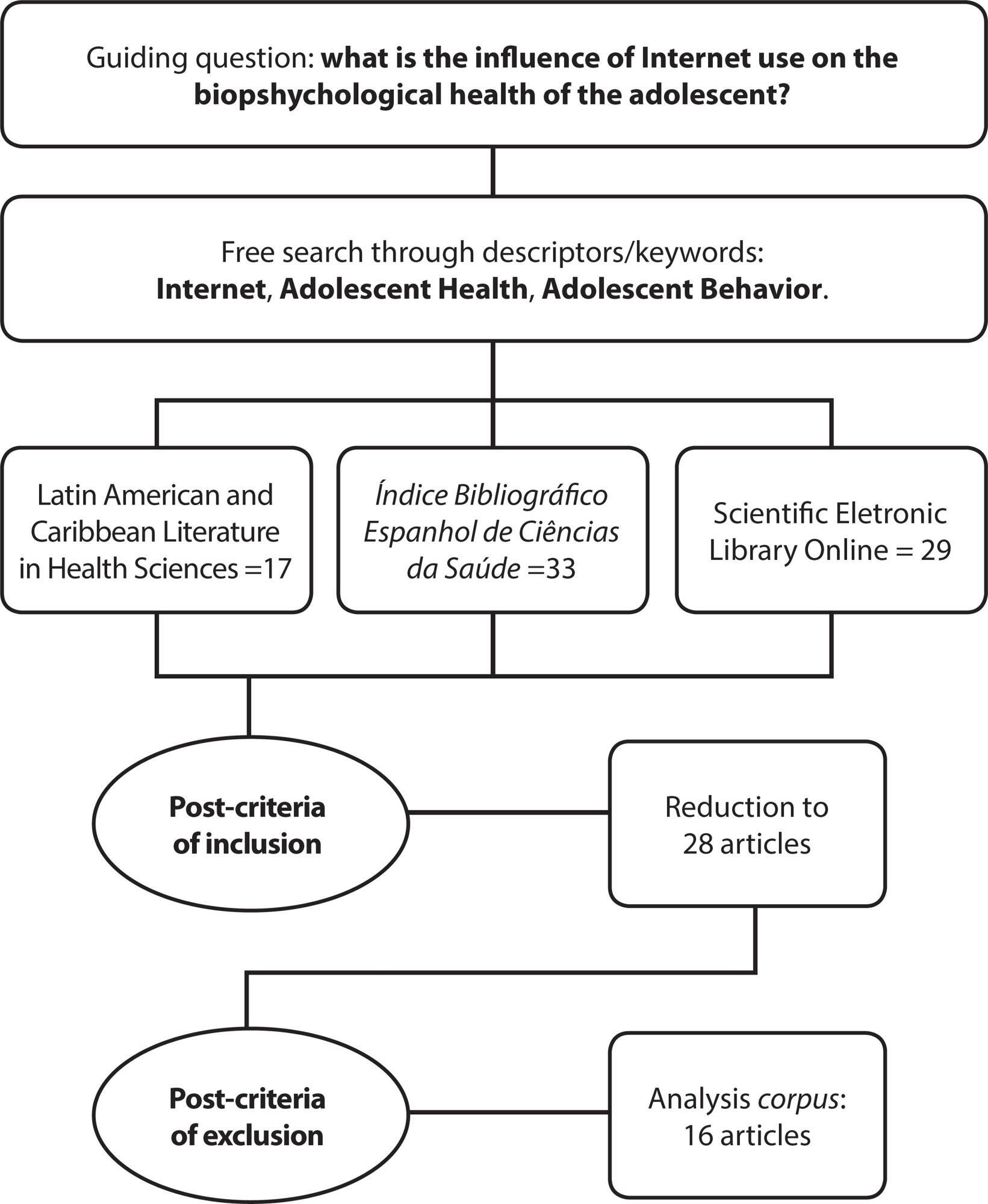
-
ARTÍCULO DE REVISIÓN21/12/2020
Hope-based interventions in chronic disease: an integrative review in the light of Nightingale
Revista Brasileira de Enfermagem. 2020;73:e20200283
Resumen
ARTÍCULO DE REVISIÓNHope-based interventions in chronic disease: an integrative review in the light of Nightingale
Revista Brasileira de Enfermagem. 2020;73:e20200283
DOI 10.1590/0034-7167-2020-0283
Visualizações0Ver maisABSTRACT
Objective:
To identify the available evidence in the scientific literature about the strategies or interventions used to promote hope in people with chronic diseases.
Method:
An integrative literature review of literature published between 2009-2019, which was conducted in online browsers/databases: b-On, EBSCO, PubMed, Medline, ISI, SciELO, PsycINFO, Google Scholar. Forty-one studies were found, of which eight met the inclusion criteria.
Results:
Most studies used a quantitative approach. There was a predominance of studies from Asia and America, addressing patients with multiple sclerosis, diabetes, congestive heart failure, and cancer. Hope-based interventions were categorized by the hope attributes: experiential process, spiritual/transcendence process, rational thought process, and relational process.
Conclusion:
Hope-based interventions, in its essence, are good clinical practices in the physical, psychological, social and spiritual domains. This is congruent with the vision of nursing, first proposed by Florence Nightingale. There seem to be gaps in the literature regarding specific hope promoting interventions.
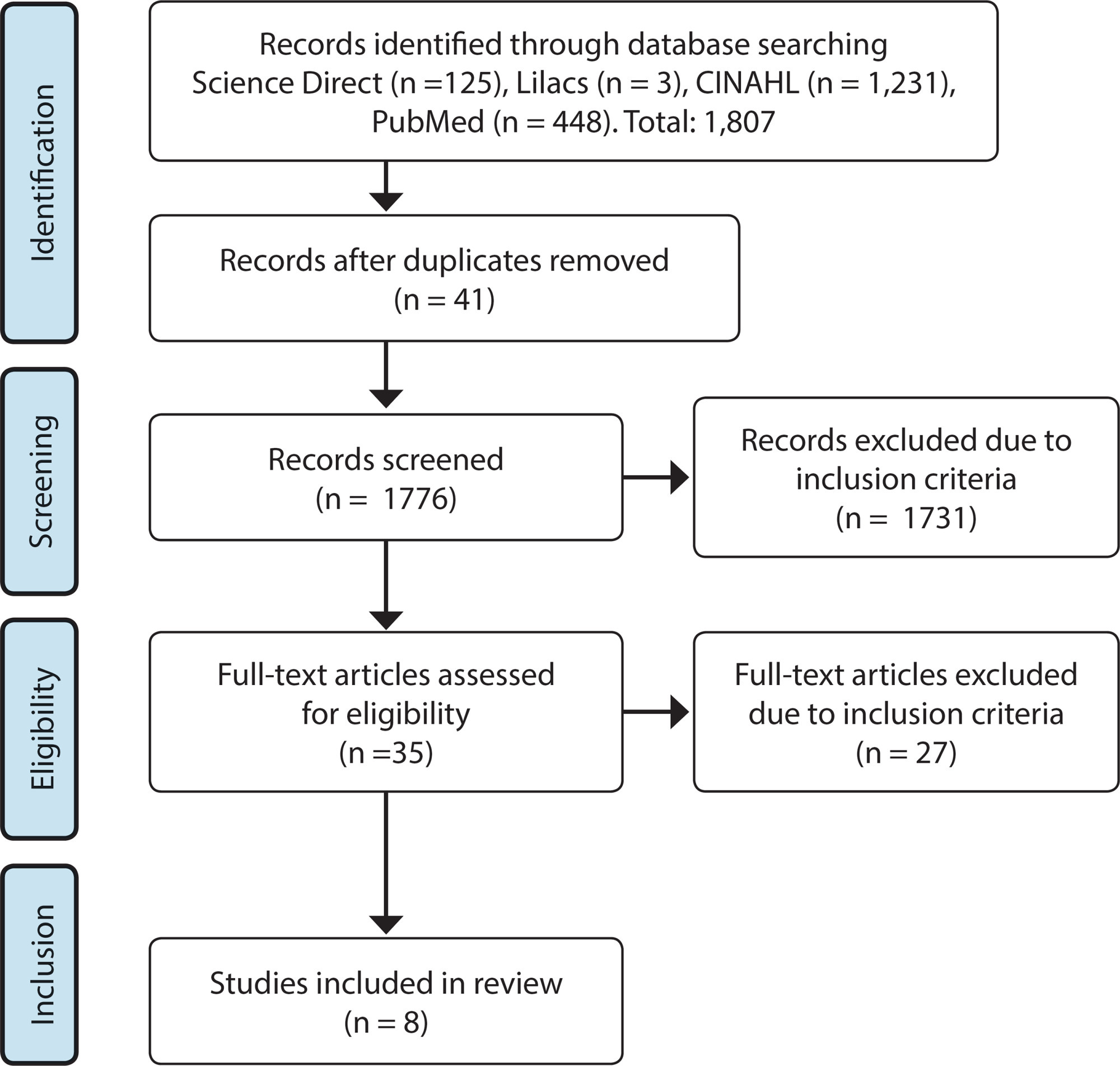
-
REFLEXIÓN10/07/2020
Psychosocial risks and the health of health workers: reflections on Brazilian labor reform
Revista Brasileira de Enfermagem. 2020;73:e20190092
Resumen
REFLEXIÓNPsychosocial risks and the health of health workers: reflections on Brazilian labor reform
Revista Brasileira de Enfermagem. 2020;73:e20190092
DOI 10.1590/0034-7167-2019-0092
Visualizações0Ver maisABSTRACT
Objective:
to reflect on the psychosocial risks and their impacts on the health of health workers in light of the Brazilian economic context and Labor Reform.
Method:
reflective study on the Brazilian Labor Reform and its impacts on health of health workers.
Results:
although the changes observed in the labor sphere have contributed to improvements in health and safety policies for, these changes have also contributed to the emergence of new risks arising from work activities, including psychosocial risks, which affect all occupational categories.
Final considerations:
we understand that the Brazilian Labor Reform carried out in 2017 leads to the weakening of labor relations, increases workers’ exposure to risks in the workplace, increases the risk of illness, and opposes the global movement of international organizations aimed at the prevention of aggravation in workers’ health and also at preserving their health.
-
REFLEXIÓN29/06/2020
Recommendations in covid-19 times: a view for home care
Revista Brasileira de Enfermagem. 2020;73:e20200310
Resumen
REFLEXIÓNRecommendations in covid-19 times: a view for home care
Revista Brasileira de Enfermagem. 2020;73:e20200310
DOI 10.1590/0034-7167-2020-0310
Visualizações0Ver maisABSTRACT
Objective:
To suggest recommendations for the practice of Home Nursing in the context of COVID-19.
Method:
Reflective study, originated from readings associated with the theme, available in current guidelines from the Pan American Health Organization, World Health Organization and the Ministry of Health.
Results:
Recommendations were developed from current scientific evidence for prevention of infections, control of epidemics and pandemics in the Brazilian home scenario.
Final considerations:
the reflections achieved contribute to guiding actions for better assistance to the patient, family caregivers and the community in the perspective of safe home care with COVID-19, and it is characterized as an introductory discussion on the theme, encouraging new studies to be carried out from the unfolding of the current scenario.
-
ARTÍCULO DE REVISIÓN29/09/2022
Nursing students’ learning from involvement in research projects: an integrative literature review
Revista Brasileira de Enfermagem. 2022;75(1):e20210053
Resumen
ARTÍCULO DE REVISIÓNNursing students’ learning from involvement in research projects: an integrative literature review
Revista Brasileira de Enfermagem. 2022;75(1):e20210053
DOI 10.1590/0034-7167-2021-0053
Visualizações0Ver maisABSTRACT
Objective:
To identify the learning outcomes and skills obtained of undergraduate nursing students involved in research projects.
Methods:
This was an integrative literature review, based on a research protocol in the CINAHL Complete databases; Cochrane Central Register of Controlled Trials; Cochrane Database of Systematic Reviews; Cochrane Methodology Register; MedicLatina; MEDLINE, Scopus and JBI, including primary and secondary studies, published between 2015 and 2020.
Results:
A total of five heterogeneous articles were included, which were categorized using Kirkpatrick’s (adapted) model. Seventeen learning outcomes acquired through participation in research projects were identified, from the learning of new knowledge and skills to the development of new attitudes and behaviors.
Final considerations:
The involvement of nursing students in research projects is important to their professional development. Future investment in research on this topic can help cement the potential of this type of student involvement.
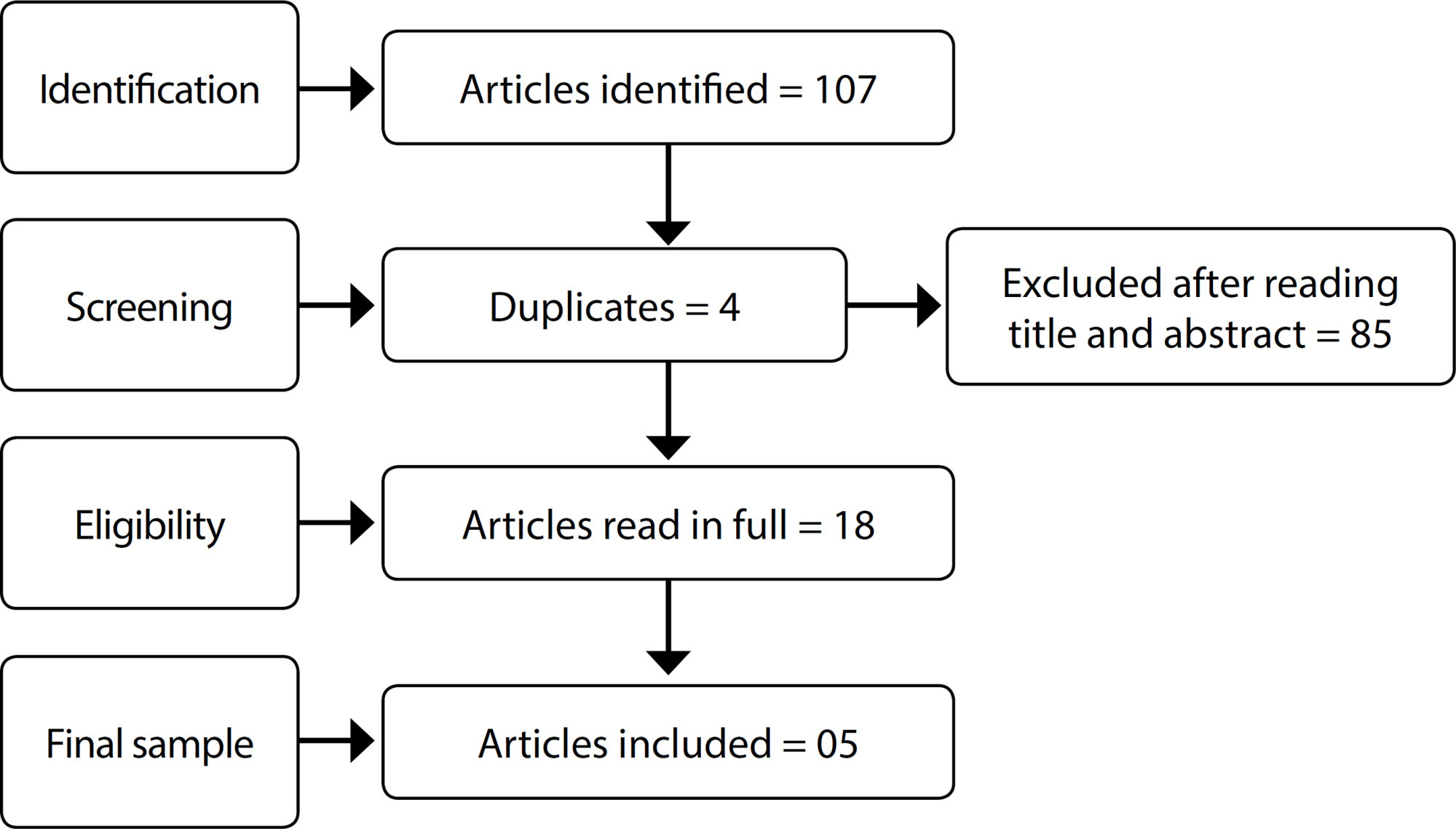
-
ARTÍCULO ORIGINAL21/10/2019
Hipermídia educativa sobre assistência de enfermagem ao parto: construção e validação de conteúdo e aparência
Revista Brasileira de Enfermagem. 2019;72(6):1471-1478
Resumen
ARTÍCULO ORIGINALHipermídia educativa sobre assistência de enfermagem ao parto: construção e validação de conteúdo e aparência
Revista Brasileira de Enfermagem. 2019;72(6):1471-1478
DOI 10.1590/0034-7167/2018-0163
Visualizações1Ver maisRESUMO
Objetivo:
construir uma hipermídia educativa sobre a assistência de enfermagem ao parto de risco habitual e realizar a validação de conteúdo e de aparência.
Método:
pesquisa metodológica, realizada seguindo as seguintes etapas: levantamento do conteúdo e planejamento dos módulos; produção das mídias e organização das unidades tutoriais; organização do espaço do aluno, tutor e de comunicação entre eles; elaboração da hipermídia; disponibilização da hipermídia; avaliação por especialistas em Enfermagem e Informática; e implementação das sugestões propostas.
Resultados:
a hipermídia educativa mostrou-se como um material validado, visto que apresentou um ótimo índice de validade de conteúdo global de 0,97 e significância estatística no teste binomial para o conteúdo e aparência.
Conclusão:
acredita-se que o uso deste material com alunos da graduação em Enfermagem contribuirá com a qualidade da assistência obstétrica, tendo em vista que se constitui em uma tecnologia ilustrada capaz de favorecer o ensino-aprendizagem sobre parto normal humanizado.
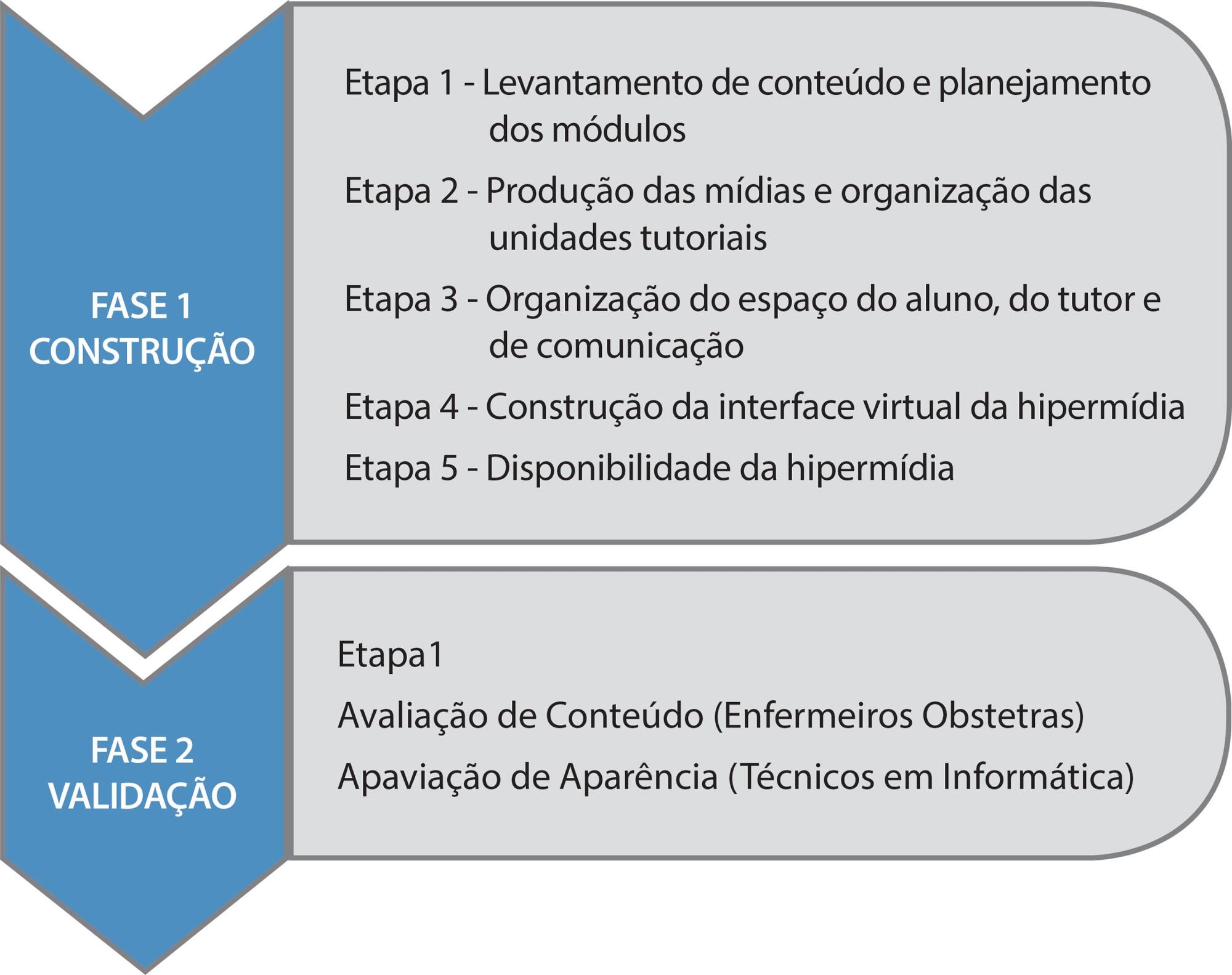
-
ARTÍCULO ORIGINAL30/03/2020
Boas Práticas de segurança nos cuidados de enfermagem em Terapia Intensiva Neonatal
Revista Brasileira de Enfermagem. 2020;73(2):e20180482
Resumen
ARTÍCULO ORIGINALBoas Práticas de segurança nos cuidados de enfermagem em Terapia Intensiva Neonatal
Revista Brasileira de Enfermagem. 2020;73(2):e20180482
DOI 10.1590/0034-7167-2018-0482
Visualizações0RESUMO
Objetivos:
identificar a percepção dos profissionais de enfermagem sobre o erro humano nos cuidados de enfermagem na Unidade de Terapia Intensiva Neonatal; analisar as estratégias de Boas Práticas propostas por esses profissionais para a segurança do paciente nos cuidados de enfermagem.
Métodos:
estudo quanti-qualitativo, descritivo. Cenário: Unidade de Terapia Intensiva Neonatal. Participantes: 22 profissionais de enfermagem. Coleta dos dados realizada por meio de entrevistas e submetidos a análise temática.
Resultados:
erro humano nos cuidados de enfermagem, identificando-se perdas de cateteres e erros no processo de medicação; causas para o erro nos cuidados de enfermagem, destacando-se a sobrecarga de trabalho; Boas Práticas para a segurança do paciente nos cuidados de enfermagem, como capacitação profissional e melhorias das condições de trabalho.
Conclusões:
demonstra-se a importância de investir em estratégias de Boas Práticas para a Segurança do Paciente, buscando-se sedimentar a cultura de segurança organizacional e estimular um ambiente propício ao gerenciamento do erro.
Palavras-chave: EnfermagemErros MédicosGestão de SegurançaSegurança do PacienteUnidades de Terapia Intensiva NeonatalVer mais -
05/12/2019
Hospital care and urinary incontinence in the elderly
Revista Brasileira de Enfermagem. 2019;72:284-293
Resumen
Hospital care and urinary incontinence in the elderly
Revista Brasileira de Enfermagem. 2019;72:284-293
DOI 10.1590/0034-7167-2018-0273
Visualizações0Ver maisABSTRACT
Objective:
to identify factors inherent in hospital care that favor urinary incontinence in the elderly.
Method:
an integrative review with Scopus, CINAHL and Pubmed searches. Includes original articles, no language restriction, published between 2008 and 2018. Rated level of recommendation and level of evidence were assessed using the Oxford Center for Evidence-Based Medicine classification. Exploited content through thematic analysis in light of the Donabedian model.
Results:
13 articles constituted the sample. There were factors such as the unjustified and indiscriminate use of devices such as the geriatric diaper; hospital structure adversely affecting the needs of the elderly; and deficit in screening, risk identification and underreporting of the problem favor urinary incontinence in the hospitalized elderly.
Conclusion:
modifiable factors related to hospital structures and care processes favor both the onset and worsening of urinary incontinence in the elderly.
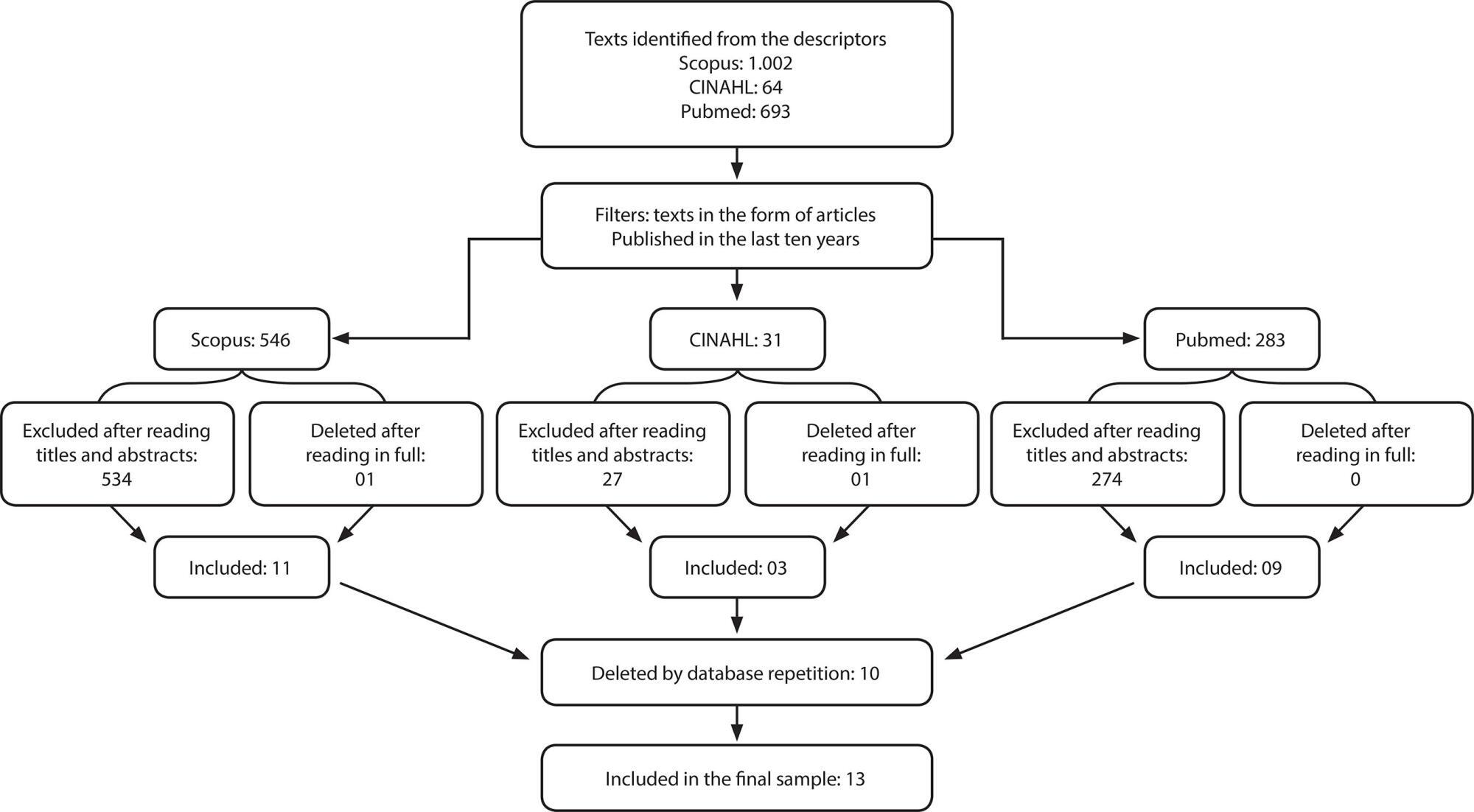
Búsqueda
Buscar en:
Nuvem de Tags
Adolescente (85) Atenção Primária à Saúde (239) COVID-19 (91) Criança (91) Cuidados de Enfermagem (269) Educação em Enfermagem (151) Educação em Saúde (139) Enfermagem (930) Enfermagem Pediátrica (86) Estudantes de Enfermagem (77) Estudos de Validação (131) Família (87) Idoso (208) Promoção da Saúde (99) Qualidade de Vida (104) Saúde do Trabalhador (86) Saúde Mental (145) Saúde Pública (82) Segurança do Paciente (150) Tecnologia Educacional (100)



